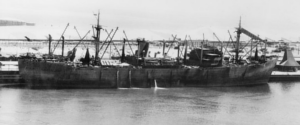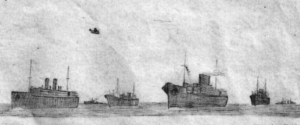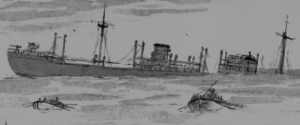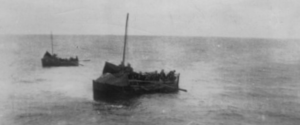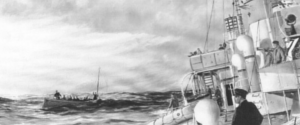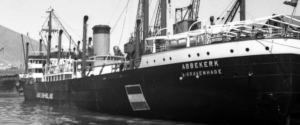
The Caribbean Sea with all its islands to hide behind was the playground of the German submarines. Luckily we left the area unmolested and sailed into the open waters of the Atlantic Ocean. Full steam ahead and of course steering a zig-zag course.
Ever since Trinidad we had doubled the lookouts. This gave us heart because we had survived the most dangerous part of the journey from Trinidad-England.

Liferafts would slide into the sea by just cutting a rope. They hold supply’s for a month and are inspected regularly. (Photobook A.W. Kik)
On 24th August we were about halfway the Atlantic Ocean about six hundred miles from our destination when the Captain received a message that a U-Boat was sighted about fifteen miles from our position. In the afternoon our lookout in the crowsnest briefly saw a dark object. Although not seeing anything further we changed course and after dark we changed even more drastically.
We were all aware that our chance of escape in this situation was very small. If it was a U-Boat of the latest design, than his speed on the surface would be considerably higher than ours, particularly with the thick growth we had on our bottom and sailing a zig-zag course. On top of this the U-Boat had a variety of technical aids to assist it in finding and following ships even at night. We just had to wait and see. The engine room watch I was given was from 8-12 hours and from 20- 24 hours. I can assure you that that night we went on watch with very mixed feelings. Up till now we had worked with the feeling that if it had to happen then so be it. It did not pay to try to look ahead. We had had this feeling for some time now and one got used to it. Up till now everything had gone OK so that was more or less expected to continue.
But now it was different, now we knew with some certainty that at any moment a torpedo could crash into the engine room. We calculated our chances e.g. the length of the engine room was about one fifth of the length of the ship. There was a four fifth chance that a possible torpedo would explode in the sugar. How about that?
That night our watch went as normal and at 23.45 hours I went as was usual topside to wake the people of the next watch. When I was trying to enter the deckhouse to check on the steering engine at the rear, the ship got an enormous bang. The large sluggish ship staggered a few times backwards and forwards.
‘So, that is the way it goes’ I thought and raced along all the cabins of the engine room personnel who had their cabin in the same passage and awoke them. After this I went to my own cabin, put on my uniform coat, put on my belt with my waterproof bag holding my most important papers and bowie knife and put on my lifejacket. My pocket torch, which I always needed in the engine room, was in my back pocket and was handy. It was then that I realized that the engines were still going and I thought: ‘I need to be down below in the engine room.’ It appeared that the engine room was not hit. The torpedo had exploded in the middle of the sugar in front of the engine room in hold No2, which had dampened the blast but had put a large hole in the hull.
Just as I opened the door to the engine room and looked down they stopped the engines. I was already a few steps down the stairs when all the people of my watch raced to the top.
You may wonder what made me go down again in a situation like this. Duty? Never! One does not wish to abandon one’s mates. In case of difficulties one may need each other. For instance in a sudden blackout, everyone no matter where he sits, stands or sleeps, races immediately downstairs. One does not think about it, it is impulse. Even in this situation where we were hit by a torpedo. If you think about it one should make a bee-line for the lifeboats. Anyhow the time had come to do exactly that. There was a quick reaction when the signal ‘Make ready for the lifeboats’ came. On the boat deck we found that the two boats on the starboard side had been thrown out of their davits by the explosion and were useless. Everybody had to get aboard the two boats on the portside which relatively speaking went well.
Those responsible for the launching of the life rafts had done this and were now with us. Just as the order came to man and lower the boats a torpedo burst into the engine room and exploded with an enormous bang.A large pillar of flames tore away the glass canopy which allowed daylight into the engine room and threw it sky high. It was lucky that the torpedo hit the ship on the same side as the first one. Otherwise we together with the boats would have been blasted away. The lowering of the boats was done perfectly; the oars were put into the rowlocks and then it was row, row as fast as we could to get away from the ship.
To watch your ship on which you had so many experiences sink is no fun. Slowly our ship disappeared under the water. Sitting in our insignificant little lifeboat it seemed to us the ship was a giant. It was now groaning under the force of all the loose materials and machines that were sliding with considerable noise towards the lowest point on the decks. Moaning the colossus slid under the water with the nose down at an angle of 60 degrees. Later we heard another explosion and the creaking and crumbling of the hull that could not stand the enormous pressure at depth.
Then it was quiet, very, very quiet. Suddenly no more humming of the ships engines or the hard droning of the exhaust system or the rushing of the water passing the ship’s hull.
All was very, very quiet. The world was now very unreal.
<< previous chapter ———————————————————————next chapter >>

